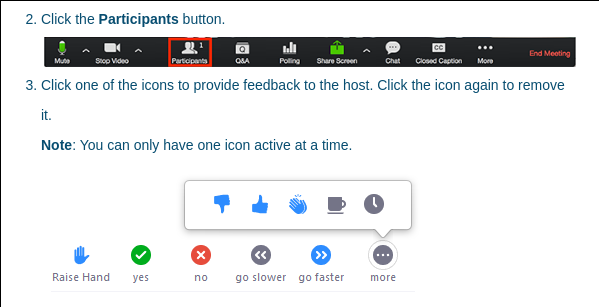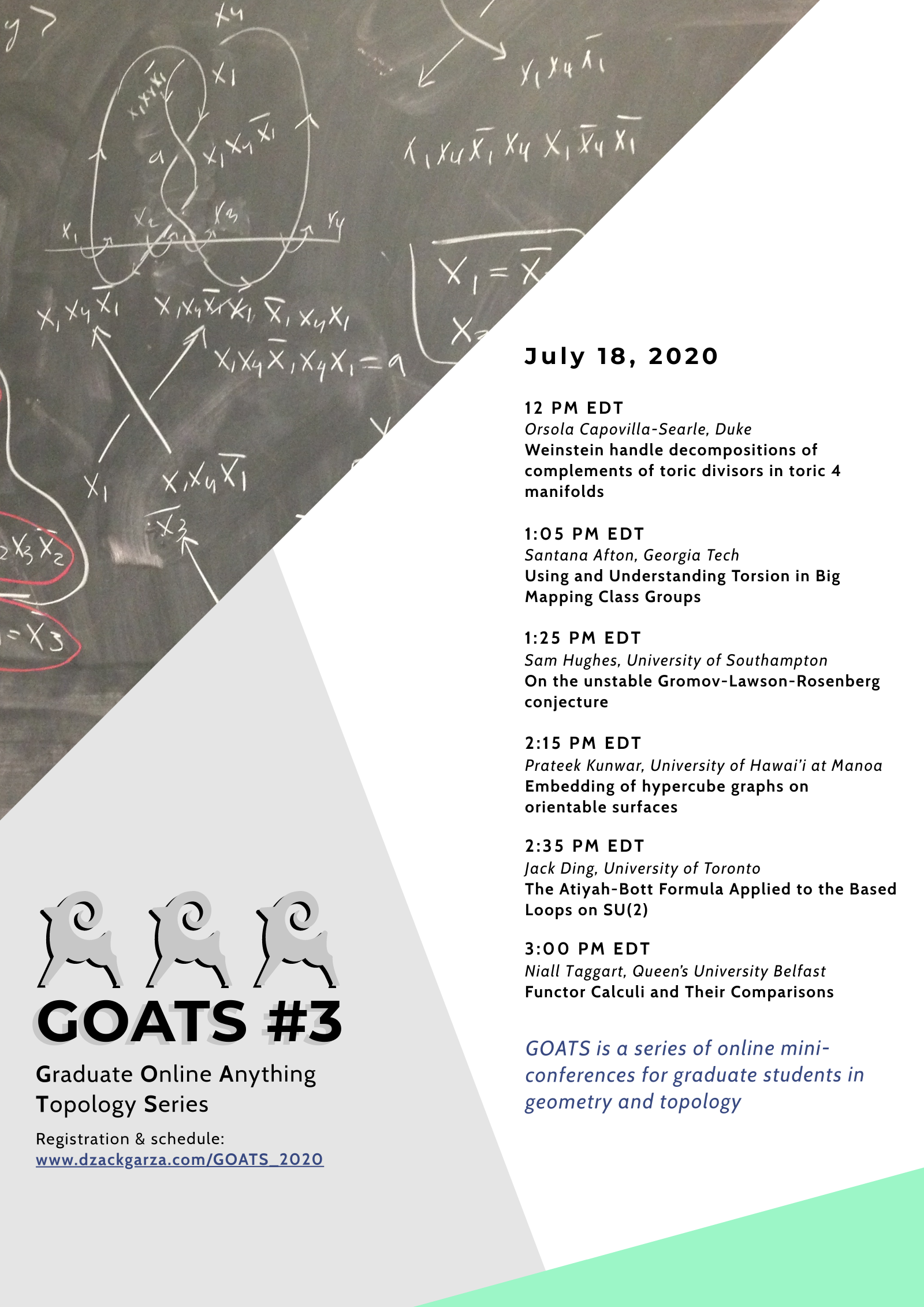The most current iteration of GOATS can be found at https://dzackgarza.com/GOATS_2020.
- You can follow and tweet under the #mathgoats2020 hashtag.
- Link to Youtube Playlist.
Schedule
12:00 PM - 1:00 PM EDT: Orsola Capovilla-Searle (Duke University)
-
Title: Weinstein handle decompositions of complements of toric divisors in toric 4 manifolds (Slides)
-
Abstract: We consider toric 4 manifolds with certain toric divisors that have normal crossing singularities. The normal crossing singularities can be smoothed, changing the topology of the complement. We develop an algorithm to draw the Stein handlebody decomposition for the complement of such toric divisors.
Joint work with Bahar Acu, Agnes Gadbled, Aleksandra Marinkovic, Emmy Murphy, Laura Starkston and Angela Wu.
1:00 - 1:05 PM EDT: Short Break
1:05 PM - 1:25 PM EDT: Santana Afton (Georgia Tech)
-
Title: Using and Understanding Torsion in Big Mapping Class Groups
-
Abstract: An infinite-type surface is a surface whose fundamental group is not finitely generated. These surfaces are “big,” having either infinite genus or infinitely many punctures. Recently, it was shown that mapping class groups of these infinite-type surfaces have a wealth of subgroups; for example, there is one particular surface whose mapping class group contains every countable group as a subgroup. By extending a theorem for finite-type surfaces to the infinite-type case — the Nielsen realization problem — we show that the group of bijections on a countable set is never a subgroup of any big mapping class group. This suggests a deeper structure behind the web of subgroups in big mapping class groups.
1:25 PM - 1:45 PM EDT: Sam Hughes (University of Southampton)
-
Title: On the unstable Gromov-Lawson-Rosenberg conjecture (Slides)
-
Abstract: In this talk we will introduce the unstable Gromov-Lawson-Rosenberg conjecture relating a $K$-theoretic invariant of compact spin manifolds to the non-existence of metrics of positive scalar curvature. If time permits we will discuss a proof of the conjecture for manifolds with fundamental group isomorphic to $\mathrm{PSL}_2(\mathbb{Z}[1/p])$ for $p\equiv 11\pmod{12}$.
1:45 - 2:15 PM EDT: Social Break
2:15 PM - 2:35 PM EDT: Prateek Kunwar (University of Hawai’i at Manoa)
-
Title: Embedding of hypercube graphs on orientable surfaces
-
Abstract: The purpose of this talk is to study hypercube graphs and their embeddings on orientable surfaces. We use rotation systems to represent these embeddings. We prove some results about the effect of adjacent switches in rotation system and create a rotation system called the ABC rotation system. Using this rotation system, we give a general theorem about the minimal embedding of $Q_{n}$. We also find some interesting classes of maximal embeddings of $Q_{n}$ such as the ‘Eulerian walk embedding’ and the ‘big-face embedding’. We prove a theorem that gives a recursively constructive way of obtaining the latter embedding in $Q_{n}$.
2:35 - 2:55 PM EDT: Jack Ding (University of Toronto)
-
Title: The Atiyah-Bott Formula Applied to the Based Loops on $\mathrm{SU}(2)$.
-
Abstract: The Atiyah-Bott Lefschetz Formula is a well-known formula for computing the equivariant index of an elliptic operator on a compact smooth manifold. We provide an analogue of this formula for the based loop group $\Omega \mathrm{SU}(2)$ with respect to the natural $(T \times S^1)$-action. From this result we also derive an effective formula for computing characters of certain Demazure modules.
2:55 - 3:00 PM EDT: Short Break
3:00 PM - 4:00 PM: Niall Taggart (Queen’s University Belfast)
-
Title: Functor Calculi and Their Comparisons
-
Abstract: Over the last number of decades more and more versions of functor calculus are arising to study a variety of different problems. The need for new calculi comes from the want for a calculus which detect extra structure. These calculi are all a categorification of Taylor’s Theorem from differential calculus, and are motivated by Goodwillie calculus. In this talk I will introduce some versions of functor calculus, all with a geometric flavour, and explain how they relate to each other. If time permits, I will further describe the relationship between these calculi and Goodwillie calculus.
Information
This is the website for GOATS, a series of online mini-conferences for graduate students in Geometry and Topology. The speakers will be graduate students, and attendance is open to anyone. We plan to hold these on an ongoing/recurring basis, and will update this page with information about future events.
- You can follow and tweet under the #mathgoats2020 hashtag.
- For those that are interested in speaking at the next GOATS, we welcome you to reach out to any of the organizers directly!
Participant Information
Adapted from the Knot Online Seminar
To Join the Meeting
-
You will need to download the zoom client and join using the meeting number sent to you via email confirmation after registering.
-
This meeting is open from 11:45am to 3:45pm (EDT).
- If this is your first time with zoom, we suggest you connect to the meeting room 10 minutes before the start time in order to get used to its functionalities.
-
After you click “join meeting”:
-
You will be directed to the zoom meeting room of GOATS. We encourage you to use your real name as you join. It makes it easier for other participants to communicate with you. You probably want to tick the box join with computer audio, otherwise you won’t be able to hear anything. Both your camera and your microphone will stay off as you join.
-
You will be able to hear and see the speaker, and see their screen/board. You can use the chat to communicate with other participants. Note that you can choose who you send messages to. The speaker will typically not read the chat. To show reaction you may use the non-verbal feed-back buttons at the bottom of the participants window.
-
Asking Questions
-
If you want to ask a question, you can raise your hand by clicking the “Participants” button:

-
At a convenient point, one of the organizers will then inform the speaker that there is a question and give you the ability to unmute yourself. You can then click the “unmute” button and ask your question to the speaker directly.
-
You may also type your questions into chat, which the organizers can then relay to the speaker.
